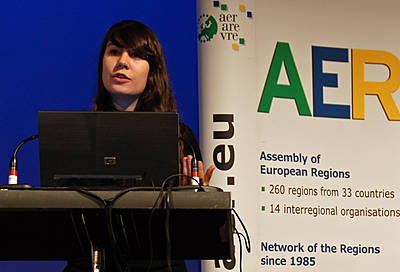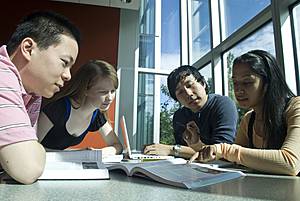By: Yannick Brusselmans
At the early age of 18, Charlotte Kudé is already president of the Youth Regional Network (YRN) at the Assembly of European Regions (AER). Halfway through her one-year term at the head of the network, the Parisian political science student takes stock of the road the YRN has travelled since its conception in Wiesbaden and the challenges that lie ahead.
Orange: How exactly did you get involved in the YRN?
Kudé: A couple of years ago, during the presidential elections in France, I started to get really interested in politics. So I got involved in the youth regional council of Île-de-France, where I took part in the committee about European issues. Since I was the only one in the whole council to speak German, they sent me one year ago to Wiesbaden to the very first meeting of the YRN. I really liked it and so at the second meeting of the network, in Poland, I decided to run for the first presidential elections of the network and was elected.
Orange: Why did you decide to run for president of the YRN?
Kudé: I was really interested in this network and I really believed that it could lead to something. I got also more and more interested in European rather than national issues, so I was keen on seeing all these European students and young people coming together from all different parts of Europe. So I decided that I wanted to play a leading role in developing this network, developed a programme and had a campaign. And because it was the first presidential election, there was a lot of work to organise and structure the network and I really wanted to do that.
Orange: It is one year now since the first YRN meeting in Wiesbaden. What are you most pleased about regarding the evolution of the network?
Kudé: I am really surprised how fast it evolved, much faster than I had ever expected. In the beginning there were only a few regions that were interested and everything was a bit chaotic because there was no real structure or organisation. So since Wiesbaden we worked hard on that and each meeting there are more and more members. The meeting now, with more than one hundred participants and 53 regions represented, is really big compared to when we started out. It’s also the way for us to gain legitimacy and the evolution is really fast and positive. Of course, we should not be overthrown by that and try to make it function in the best way possible. Because the more we are, the more complicated it is to get real concrete results.
Orange: What do you regard as the biggest challenges?
Kudé: Communication. In our working groups we have problems with communicating because we all live geographically very far away from one another. So we communicate through internet, Googlegroups, Facebook and so on. You also always have very active members who work together, but it’s really difficult to get everyone implicated in the project and the working groups. The second problem is that not all the AER regions are represented. So, we have to foster the development of youth councils or parliaments in regions where there are none. It will take time, but I think we are going towards complete integration of all the regions, just like in the AER. Once the regions know about the network and see the benefits, I think they will join in. And the third challenge is to have contact to local politicians and decision makers on which we really can have influence and who really listen to us.
Orange: What are the future goals for the network?
Kudé: Up till now it was a lot of work to build up the structure and organise everything, but now we can finally look forward. So our next steps will be to really encourage youth participation and the creation of youth councils where there are none yet. Because if we really want all of the European youth connected together, we need to have a solid base.
















